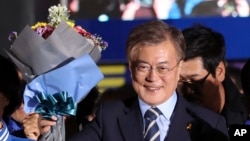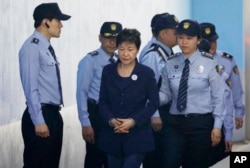Newly-elected South Korean President Moon Jae-in is intent on reopening inter-Korean channels of dialogue and engagement, despite Pyongyang’s continued missile tests and U.S. calls for increased sanctions.
The new liberal leader won a special presidential election in early May following the impeachment of conservative former President Park Geun-hye for her alleged involvement in a multimillion dollar corruption scandal. Park denied all criminal charges related to the scandal including bribery at the onset of her trial in Seoul on Tuesday.
Incremental measures
Shifting away from his predecessor’s hardline North Korea policies, President Moon wants to balance international sanctions imposed on the Kim Jong Un government for its continued nuclear and ballistic missile tests with positive incentives to ease tensions and rebuild trust.
“Humanitarian assistance to North Korea. Or another example could be assisting with the planting of trees in North Korea, or President Moon Jae-in might allow incremental exchange and cooperation between North and South Korea,” said Moon Chung-in, who was appointed a special aide for security and diplomacy by the new president this week to help formulate outreach polices.
A distinguished professor emeritus at Yonsei University in Seoul and a former ambassador for international security affairs, Professor Moon is a longtime advocate for increased engagement policies.
Suspending military drills
Sanctions limiting North Korea’s access to cash that could fund weapons programs restrict Seoul’s ability to immediately reopen the jointly run Kaesong Industrial Complex in North Korea that was closed following Pyongyang’s fourth nuclear test in 2016, or the Kumgang Mountain tourism project that South Korea suspended after a visitor was shot by North Korean soldiers in 2008. But Professor Moon said these projects could be considered later if North Korea meets certain conditions, like suspending missile and nuclear tests.
The South Korean president is also open to a proposal made by Beijing calling for Pyongyang to stop further nuclear and missile tests in exchange for a suspension of joint U.S.-South Korean military exercises.
“Moon Jae-in made it very clear during the election campaign that if North Korea freezes, then South Korea may consider downsizing the scale of the ROK (Republic of Korea) – U.S. joint military exercises and training,” he said.
Mixed messages
Although President Donald Trump has prioritized preventing North Korea from developing a nuclear intercontinental ballistic missile (ICBM) that can reach the U.S. mainland, his administration has sent conflicting signals. There had been an initial emphasis on the possible use of military force against North Korea. But Washington has since downplayed this as a worst-case scenario, as it would risk triggering a nuclear war.
The Trump administration seems now to be relying on China to force its economically dependent ally in Pyongyang to capitulate through crippling sanctions. While Beijing wants a denuclearized North Korea, analysts say, it won’t likely take harsh measures to force the collapse of the Kim regime that would also result in regional instability and increased U.S. power in the region.
On Tuesday China's U.N. ambassador, Liu Jieyi, would not commit to increasing sanctions further against North Korea for its latest test of a medium range ballistic missile test. Instead Liu focused on better implementation of current sanctions and trying to “achieve denuclearization through dialogue.”
By taking the diplomatic lead to resolve this nuclear standoff, Professor Moon said the South Korean government can help develop a workable compromise that neither Washington nor Pyongyang can make on their own.
“It might be somewhat difficult for the Trump administration to take the lead in making a breakthrough dialogue and negotiation with North Korea. Maybe South Korea can play that kind of bridging role,” he said.
Choe Son Hui, a senior North Korean foreign ministry official, recently said Pyongyang would be open to dialogue if conditions are right. The Kim Jong Un government insists it will not give up its strong nuclear deterrence needed to defend against the U.S. threat of invasion.
North Korea has also reneged on past deals to suspend nuclear activities for economic aid.
Youmi Kim in Seoul contributed to this report










